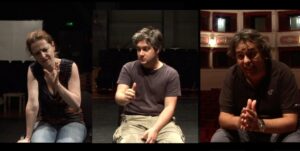Laura Malacart is a practitioner and independent scholar born in Italy and based in the UK.
Her practice questions forms of human oppression or planetary oppression via the notion of humans’ exceptionalism (The Difference between a Bird and a Plane, 2020). Her work reflects on research findings to question normative and dominant ideologies and their modes of representation through the use of aesthetic forms. She is the author of The Little Book of Answers, an ongoing project on citizenship praxis originally created as a participatory performance for the Turbine Hall at Tate Modern and featured in the critical anthology Feminist Art Activisms and Artivisms published by Valiz Press (2020).
She has a PhD on ventriloquisms and the use of the voice in fine art film (Slade, UCL) and an MA in Photography from the RCA. She has lectured for a range of institutions in London and as a visiting lecturer outside the UK and her multidisciplinary practice has featured in major museums and institutions as well as public spaces. www.lauramalacart.net
Voicings (Italy)
Sound piece
2012
In 2007 a series of white British actors with RP pronunciation responded to a call by Laura Malacart to donate an hour of their time for her project Voicings. She filmed each actor learning a script penned by a refugee that describes an experience of linguistic difficulty in their new life in English – the actors were also instructed to learn the errors contained in the text. Voicings (Italy) was commissioned by Radio Papesse to apply the methodology of Voicings to the context of the economic migration in Santa Croce sull’Arno, an Italian village on the outskirts of Florence and therefore enable a socio-linguistic exploration of migration in the area. In this area more than half of the children currently born are of African or Eastern Europe descent, such large immigration being justified by the lasting presence of the tannery industry. Voicings uses the testimonies of the immigrants performed through the vocal experimentations of professional actors grappling with the errors of the immigrants, who, in turn, generate at times new linguistic and poetic constructions. Whose texts are performed through the vocal experimentations of professional actors who grapple with errors or new linguistic constructions, at times highly poetic, penned by the immigrants. The outcome is a 30-minute sound piece that weaves vocalisations and testimonies in a continuous narrative. The experience of Voicings (Italy) is considerably different from that of Voicings (UK) not only because the languages and socio-geographical contexts produce distinct contents but also formally as Voicings (UK) exists as a video installation rather than a sound piece.
The Case of the Mini Vigili
Video
2019
The Case of the Mini Vigili (2014/19) is a film that begun as a series of portraits realised in collaboration with a group of kids who were taking part in a school initiative that enrolled them as voluntary traffic wardens. Since traffic wardens in Italy belong to the body of the police, these kids in law enforcement uniforms find themselves in a peculiar situation since as minors they cannot enforce the law. The film is exclusively narrated by the kids voices as they reflect on their understanding and experience of what it means to wear this uniform in public. It can be noted that a fetishised use of uniforms in children was introduced by fascism as a pedagogic tool. This particular initiative has been deemed successful and has been replicated by other schools.
